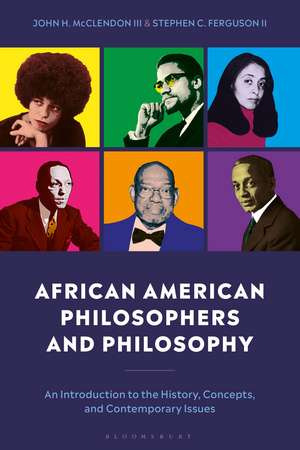African American Philosophers and Philosophy: An Introduction to the History, Concepts, and Contemporary Issues
Autor Stephen Ferguson II, John McClendon IIIen Limba Engleză Paperback – 12 iun 2019
| Toate formatele și edițiile | Preț | Express |
|---|---|---|
| Paperback (1) | 168.59 lei 3-5 săpt. | |
| Bloomsbury Publishing – 12 iun 2019 | 168.59 lei 3-5 săpt. | |
| Hardback (1) | 499.66 lei 6-8 săpt. | |
| Bloomsbury Publishing – 12 iun 2019 | 499.66 lei 6-8 săpt. |
Preț: 168.59 lei
Preț vechi: 205.15 lei
-18% Nou
Puncte Express: 253
Preț estimativ în valută:
32.26€ • 34.50$ • 26.90£
32.26€ • 34.50$ • 26.90£
Carte disponibilă
Livrare economică 27 martie-10 aprilie
Preluare comenzi: 021 569.72.76
Specificații
ISBN-13: 9781350057951
ISBN-10: 1350057959
Pagini: 304
Dimensiuni: 156 x 234 x 24 mm
Greutate: 0.48 kg
Editura: Bloomsbury Publishing
Colecția Bloomsbury Academic
Locul publicării:London, United Kingdom
ISBN-10: 1350057959
Pagini: 304
Dimensiuni: 156 x 234 x 24 mm
Greutate: 0.48 kg
Editura: Bloomsbury Publishing
Colecția Bloomsbury Academic
Locul publicării:London, United Kingdom
Caracteristici
Exposes significant numbers of stereotypes and myths on the intellectual inferiority of African-American in general and African American philosophers in particular
Notă biografică
John H. McClendon III is Professor in the Department of Philosophy at Michigan State University, USA.Stephen C. Ferguson II is an Associate Professor in the Department of Philosophy and Religious Studies at North Carolina State University, USA.
Cuprins
List of TablesAcknowledgementsBiographical Information on Selected African American PhilosophersIntroduction1. Through the Back Door: The Problem of History and the African American Philosopher/Philosophy2. The Problem of Philosophy: Metaphilosophical Considerations3. The Search for Values: Axiology in Ebony4. Philosophy of Science: African American Deliberations5. Mapping the Disciplinary Contours of the Philosophy of Religion: Reason, Faith, and African American Religious CultureBibliographyIndex
Recenzii
This groundbreaking work introduces us to the ideas of African American (AA) who were academically trained in classical and modern philosophy. It shows the extent that philosophical reflection has been present among AA scholars, though their work has been ignored by the philosophical establishment. The chapters explore AA contributions to philosophical questions regarding: the origins of philosophy; ethics; aesthetics and the philosophy of music; philosophy of science; and the philosophy of religion. The glossary is invaluable resource. It provides a list of 103 AA's with doctorates in philosophy and related fields granted since emancipation, the institution they graduated from, and their dissertation title. This work provides a needed historical framework for AA academic philosophy.
I have been searching for a work that speaks to the vast history of the Black philosophical experience in the United States, from the perspective of a materialist approach. In clear and detailed language, the authors examine philosophy, once committed to an bourgeois ideology, by recovering the legacy of Black Philosophical thought.
Ferguson and McClendon's indispensable African American Philosophers and Philosophy recovers a rich legacy of Black philosophical thought, demonstrating its deserved place at the center of the history and practice of academic philosophy. Too often, Black philosophy has been regarded as peripheral and inessential. Ferguson and McClendon show that philosophy's pretensions to universalism can be realized only by attending to the particular philosophical concerns of all its practitioners.
The chapter on philosophy of religion is by far the most interesting, because publishing American African philosophers' debates about science and metaphysics is rare . An important volume . Summing Up: Highly recommended. Upper-division undergraduates through faculty.
I have been searching for a work that speaks to the vast history of the Black philosophical experience in the United States, from the perspective of a materialist approach. In clear and detailed language, the authors examine philosophy, once committed to an bourgeois ideology, by recovering the legacy of Black Philosophical thought.
Ferguson and McClendon's indispensable African American Philosophers and Philosophy recovers a rich legacy of Black philosophical thought, demonstrating its deserved place at the center of the history and practice of academic philosophy. Too often, Black philosophy has been regarded as peripheral and inessential. Ferguson and McClendon show that philosophy's pretensions to universalism can be realized only by attending to the particular philosophical concerns of all its practitioners.
The chapter on philosophy of religion is by far the most interesting, because publishing American African philosophers' debates about science and metaphysics is rare . An important volume . Summing Up: Highly recommended. Upper-division undergraduates through faculty.
